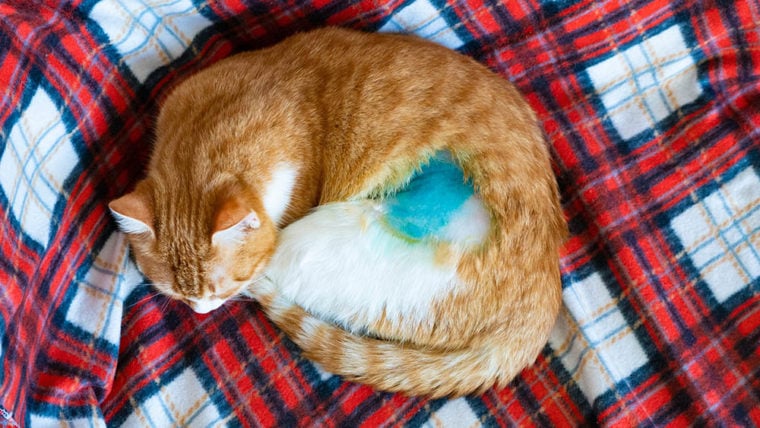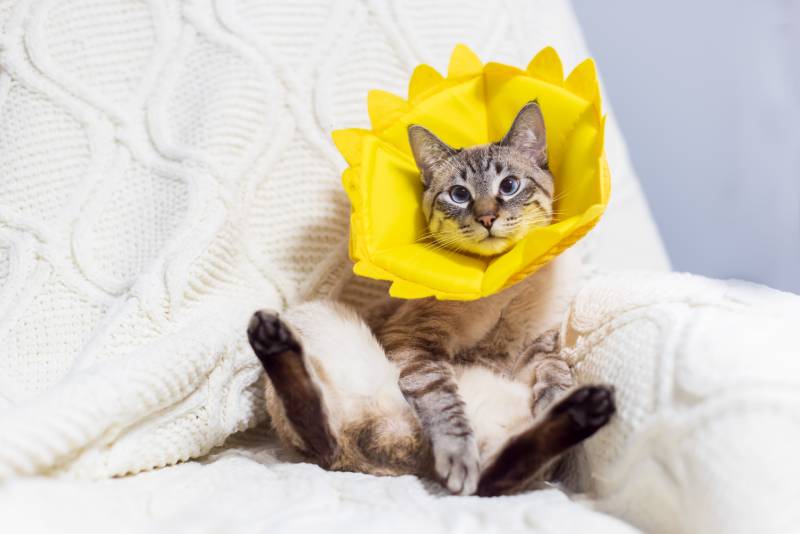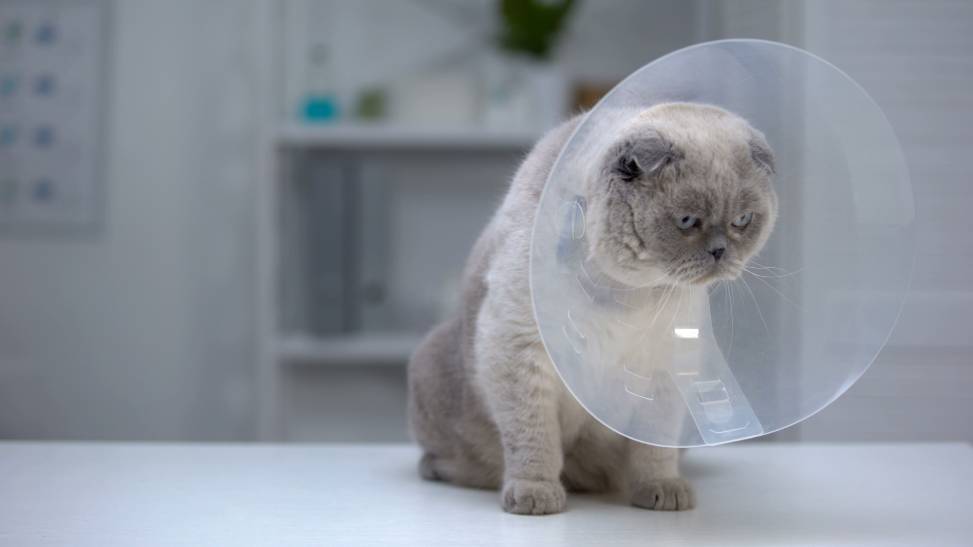
Click to Skip Ahead
You may be surprised to find out that neutering is considered a common, typically straightforward surgical procedure in cats. Neutering refers to the surgical procedure of removing a male cat’s testicles. Most commonly, young or juvenile cats will have this procedure to both help decrease the feline over-population problem, and to help prevent individual cats from spraying. A routine neuter should take your cat only 10-14 days to recover and heal.
If there are other underlying issues with your cat, such as age and/or being cryptorchid (when one or both testicles do not descend like normal into the scrotum), recovery may take longer.
For the purpose of this article, we will focus on uncomplicated, routine neuters.
Routine Neuter
Once your cat has been sedated, a typical neuter only takes a few minutes. The surgical area (scrotum and surrounding skin) is clipped free of fur and scrubbed with a sterile solution. Each testicle is removed through small incisions made through the scrotal skin and tissue. At least one if not multiple knots are made when removing each testicle to help control any bleeding. The incision is then left to heal by what is referred to as second intention; this is when a wound is left to heal open without closing or apposing the wound with sutures, staples or tissue glue.
Neuter Aftercare
As mentioned above, the surgical wound itself is left to heal open. Because of this, you want to make sure that your cat cannot lick or chew the area by putting an e-collar on him. You will also want to make sure that litter does not get stuck within the wound while it is healing. You can switch to a non-clumping litter, use shredded paper, or look for recycled paper pellet litter.
Your veterinarian may recommend antibiotics for the surgery that can be given as a liquid, pill, or even a long-acting injection given at the hospital.
Many people don’t think their cat needs pain medications following a neuter. This is false. Please, for the sake of your cat’s comfort, make sure there are multiple days’ worth of pain medications sent home with your cat.

Frequently Asked Questions
Does My Cat Need to Be Supervised While Recovering?
To make a long story short, yes and no. You need to watch your cat and make sure he is eating and drinking normally, not acting painful, not running around, and that the surgical site doesn’t develop any obvious infection or irritation. However, you don’t need to hover over your cat 24 hours a day.
Depending on your living space, you can keep your cat in a small room, such as the bathroom, laundry room, or a spare bedroom—the room with the least amount of space for your cat to run and jump onto furniture. If you have space, you can keep your cat in a large dog crate while they recover. The crate needs to be big enough to keep food, water, a bed, and a litterbox, but to also confine your cat from running around.
Confinement is imperative to a smooth recovery process. Confinement will help prevent excessive running, playing, and jumping. Any of these activities can cause swelling, bleeding, and/or discharge of the surgical site to develop. These complications can greatly delay healing past the 10–14 day mark. While your cat may disagree, he will be fine for 10–14 days in confinement.
If your cat was an adult when neutered, had any complications, or was a cryptorchid, your veterinarian may recommend confinement for longer.
What Do Neuter Complications Look Like?
Wound healing takes time—whether from a simple paper cut or a major surgery. A body needs to go through the processes of inflammation, healing, and scar formation.
Inflammation is a normal progression to any healing process. However, excessive swelling or seromas are considered a complication. We can often see this after neutering if your cat has been too active. We can also see excessive bleeding from too much activity as well.
If you think your cat is experiencing complications from the neuter, please contact the veterinarian who performed the surgery. You may even be able to send them a picture of the surgical site for them to evaluate remotely.

What if My Cat Was Cryptorchid?
Cryptorchid refers to the condition when one or both testicles do not normally descend into the scrotum during maturation. Testicles actually develop separately within the abdomen, one on each side of the body. As male kittens grow through the kitten phase, these testicles will travel through what is called the inguinal canal, from the abdomen into the scrotum. To be considered cryptorchid, one or both testicles won’t make it down into the scrotum.
The missing testicle may still be within the abdomen. Or, the testicle may have gotten stuck near the scrotum and can be seen and felt just under the skin. Where the missing testicle(s) are will determine what type of surgery your veterinarian will need to do to complete the neuter.
With that information, your veterinarian will speak to you about the increased length of surgery, what type of surgery will be performed, and what to expect as far as aftercare for your particular cat. Oftentimes, your cat will have a total of two incisions, each in a different area of the body—compared to having two incisions both within the scrotum with a regular neuter. With cryptorchid surgeries, stronger pain medications, antibiotics, and even sedatives can be prescribed to keep your cat comfortable and quiet during recovery.
Conclusion
Cat neuters are considered a common surgery and are necessary to help control the feline overpopulation problem. Young and otherwise healthy cats should be completely recovered in 10–14 days after a routine neuter. If your cat is cryptorchid, increased recovery time will be determined by how extensive the surgery is to remove both testicles. Complications can arise but are much less common when you help to keep your cat quiet, prevent excessive trauma to the surgical site, and follow all after-care instructions for your cat.
See also:
- How to Prepare a Cat for Surgery (Vet Answer)
- Eating & Drinking for Cats Prior to Spaying & Neutering: Our Vet Explains
Featured Image Credit: ozanuysal, Shutterstock







